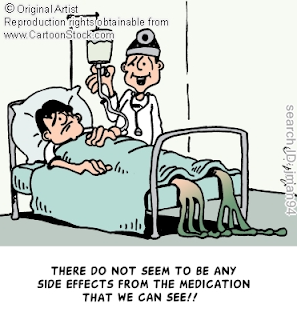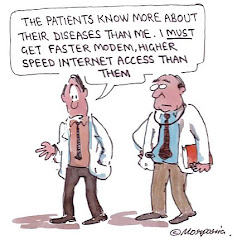
There may be a reason for doctors forgetting to give patients adequate information, besides them feeling that the patients best interest is them not knowing everything. A patient should ask question about their condition and ask about potential side effects. Recently, a commercial can be seen on television telling individuals what 10 questions to ask their health care provider:
2)How many times have you done this?
3)When will I get the results?
4)Why do I need this surgery?
5)Are there any alternatives to surgery?
6)What are the possible complications?
8)How do you spell the name of that drug?
9)Are there any side effects?
10)Will this medicine interact with medications that I'm already taking?
Doing research before taking the medication can be beneficial to patients. Also, ask the pharmacist about medications and side effects. Patients should realize that fairly new medications have not yet fully been tested in a way to show all potential side effects compared to older drugs.
Consumers can be aware of recent updates by going to the FDA website. Drugs are constantly being put out and can cause confusion in patients understanding the benefits or risks associated with a particular drug. The commercials on television advertising popular drugs can also cause a burden between the doctor patient relationship. The patient could easily be persuaded by the add that the new drug matches their diagnosis. This can persuade doctors to use the new drugs that are more costly than older drugs that cost wise are cheaper. It can also have a completely different effect as well, it can cause doctors to be less paternalistic and patients to become more autonomous, causing the patient to want the new drug the doctor might not be familiar with that doesn't even suit their particular diagnosis like an older drug. Also keep in mind all of the pharmaceutical company reps that visit the physicians office. These reps leave samples and can try and persuade doctors to use their drug. Most of these drugs remember are just newer variations of the older drugs and have not been tested enough to generate other possible side effects.
www.drugdigest.org allows patients to access a drug database, see photos of medications, check interactions,compare drugs, and help patients feel a little more informed.
www.nofreelunch.org gives patients a little tool. Patients can ask doctors to take the pledge and the website will soon publish a list of doctors who are refusing gifts.
All drugs have side effects. If the physician does not tell the patient the benefits and risks associated with the drug, patients should ask questions. A patient should be well aware of all serious, as well as, common side effect. The Internet makes it easy for consumers to access this information. Doctors are gatekeepers to the prescription world, but a patient has the right to deny taking the medication and ask for an other form of therapy.



No comments:
Post a Comment